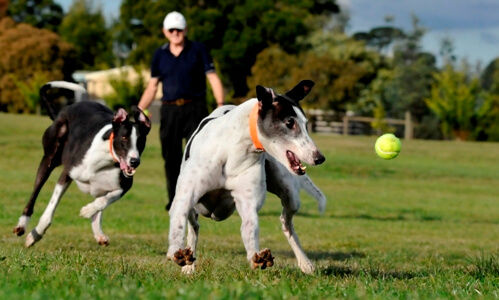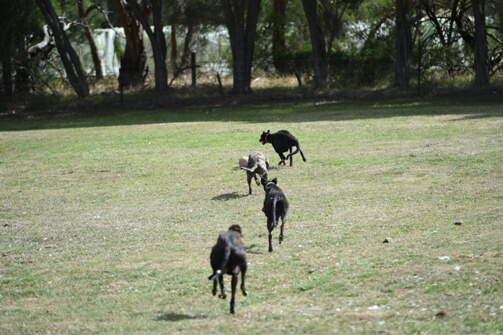
On this page you will find:
- Socialisation
- Chasing Games
- Creating Positive Experiences
- Skills for Life
The Fifth Week Onwards
As pups develop, they will become more and more co-ordinated, and their play will start to mature as their characters form. This time is called the ‘Socialisation Period’. This is basically the time where they learn all about what is ‘normal’ in their world. After the socialisation period ends, they will be suspicious of new and novel experiences so it is important to expose them to the things they will experience later in life – both at the race track and as a pet when they retire.
Socialisation is not just about getting them used to other dogs, it includes exposure to people, handling, noises, and smells. Pups can be prepared for their racing life by getting them used to being examined and handled, getting them used to travel in the float or car, exposing them to the sounds of the track, they can even be introduced to the starting boxes – all in a positive way.
Pups at this age need to get used to different types of flooring so they are confident walking on surfaces other than concrete or grass – it makes walking into the vet and into the kennels at the track much easier later on. They are developing their motor skills so they need to have exposure to uneven surfaces, obstacles, and toys and objects that move in different ways. Think of this as developing the skills that will eventually allow them to take a corner at speed, or to re-balance after a knock or check in a race.

One of the most important behaviours you want to encourage at this age, and throughout a puppy’s development, is chasing behaviour and you can do this by playing ‘chasing games’ – both with individual pups and with small groups of pups. The more fun they have chasing and playing with toys (pulled on a rope, or moved with your hands) as puppies, the more likely they are to engage in chasing behaviours later in life. If you have pups that are a little hesitant or who get bullied by their litter mates, let them have the opportunity to play chase games and have some success on their own, rather than teaching them that other dogs always win the chase games.
Another life skill to introduce at this age is to get the puppies used to short periods of time on their own, away from their litter mates and their mother. This can help prepare them for times when they may need to be confined on their own (such as a trip to the vet, or when they have to travel to the track alone), and provided it is introduced in a positive way, it can build confidence in the pup. ‘Alone time’ or short periods of confinement can be paired with eating a meal, or some other reward. You don’t want to have them away from the rest of the litter for so long that they become distressed, so make sure you finish the exercise before they realise that they are on their own.
At this age greyhound pups can have a warm bath (using a puppy-safe shampoo) as long as you make sure they are totally dried off as they as still susceptible to the cold. They can even be introduced to wearing a collar and to walking on a lead.

The list of life skills that a greyhound will need to successfully navigate rearing, breaking-in, racing, and then life in a family home is quite long, so it is up to the breeder of the litter to start them on their way so they are prepared for the wider world. Greyhounds which do not have much exposure, handling or training at this age often find the transition to racing life very difficult, and take much more time and attention at the breaking-in stage, and sometimes fail simply because the process is too overwhelming.
Under-socialised greyhounds end up costing their owners more – an extra week or more at the breakers or more spelling time – and are far more likely not to break in well because it is all so overwhelming for them. If they do make it to the track they are harder to work with and tend not to kennel or travel well. When you think about what you are likely to spend in rearing and breaking-in costs, it makes sense to put in the time and effort to establish the behaviours that are critical for success.
Just remember that the most success will come from ensuring that all of the experiences you expose the puppy to should be controlled and positive.

